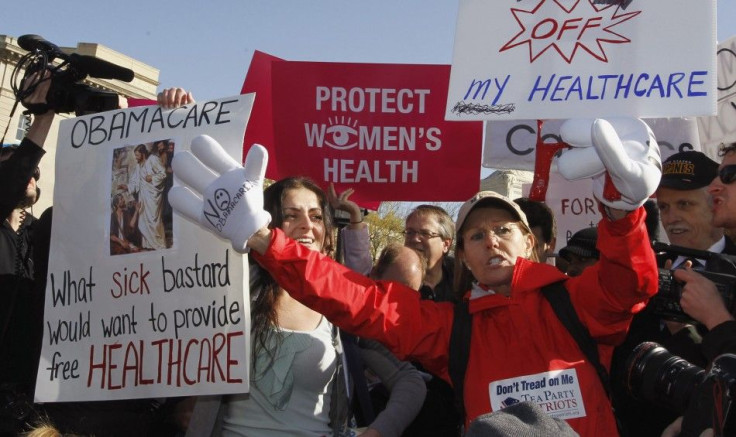Supreme Court Health Care Decision: How Does It Affect Consumers?

In a dramatic victory for President Barack Obama, the U.S. Supreme Court on Thursday upheld the administration's health care reform law, finally settling the question of the law's constitutionality after almost two years of skepticism and attacks from opponents.
But the decision is far from being solely a political victory. The 2010 law, formally known as the Affordable Care Act, is expected to extend health insurance coverage to as many as 30 million Americans who are currently uninsured. Here's how the decision will impact consumers:
The Uninsured:
The nation's high court upheld the legality of the law's individual mandate -- the requirement on Americans to purchase health insurance by 2014 or face a penalty -- although individuals who already have some form of insurance are exempt from that provision.
In 2014, the penalty will be $285 per family, or 1 percent of their income, whichever is higher. By 2016, it increases to $2,085 per family, or 2.5 percent of their income.
By 2016, an estimated 17 million low-income Americans will receive health coverage through an expansion of the government-run Medicaid program that will be administrated by the states. Individuals with incomes under 133 percent of the poverty level -- in 2012, that's $14,856 -- will be able to qualify for Medicaid coverage. Analysts expect the newly enrolled will mostly include adults without children or disabilities, since low-income families and those with disabilities are already eligible for the government program.
Starting in 2014, those without employer-sponsored health plans will be able to purchase coverage directly from state-based health insurance exchanges. Individuals and small business will be able to choose between several affordable private plans in these marketplaces, where they will also be able to apply for federal tax subsidies to ease the cost of coverage.
The Insured:
Even those who are already covered by private health insurance plans will benefit from the Affordable Care Act's several consumer protection provisions. Among some of the provisions already in place, one allowing young adults stay on their parents' health plans until age 26 -- a change the White House estimated has expanded coverage to 2.5 million young adults -- and another requiring insurers to cover a number of preventive care services without co-pays or out-of-pocket costs. The Obama administration estimates 54 million Americans with private health coverage have already received higher-quality preventive care coverage as a result.
In what supporters say is one the law's biggest accomplishments, beginning in 2014 the law makes it illegal for any health insurance company to deny coverage because of an applicant's pre-existing health conditions, or set unreasonable rates on health plans because of those conditions.
Pre-existing medical conditions is one of the main ways private insurers deny coverage to individuals applying for non-group coverage, according to The Commonwealth Fund, which reports more than 13 million non-elderly adults have been denied coverage because of their medical conditions.
Plus, because the individual mandate will bring millions of new people into the health insurance market, analysts expect the insured will avoid a spike in premiums that could have resulted if the Supreme Court had tossed that provision.
The Elderly:
Millions of seniors who fall into Medicare's prescription drug coverage gap -- that is, when they do not have insurance to help cover the cost of their medications - will save hundreds of dollars on prescriptions because of the Thursday's decision.
Last year, 3.6 million Medicare beneficiaries saved more than $2.1 billion on prescription drugs, an average of $604 per person, as a result of a section of the law requiring drug companies to provide a 50 percent discount on brand-name drugs for seniors who fall into that coverage gap.
Medicare beneficiaries will continue to have preventive health services covered with no out-of-pocket charges, an option that 32.4 million beneficiaries reportedly took advantage of in 2011.
Taxpayers:
The federal government is set to spend more than $1 trillion over the next decade to subsidize health care coverage and expand eligibility for Medicaid. However, the nonpartisan Congressional Budget Office estimated the law may actually reduce federal deficits at a modest rate in its first decade, and then more significantly afterward.
According to an analysis from the nonpartisan Committee for a Responsible Federal Budget, federal budget deficits would have increased by about $119 billion over the next 10 years if the Affordable Care Act was overturned in its entirety.
© Copyright IBTimes 2024. All rights reserved.





















